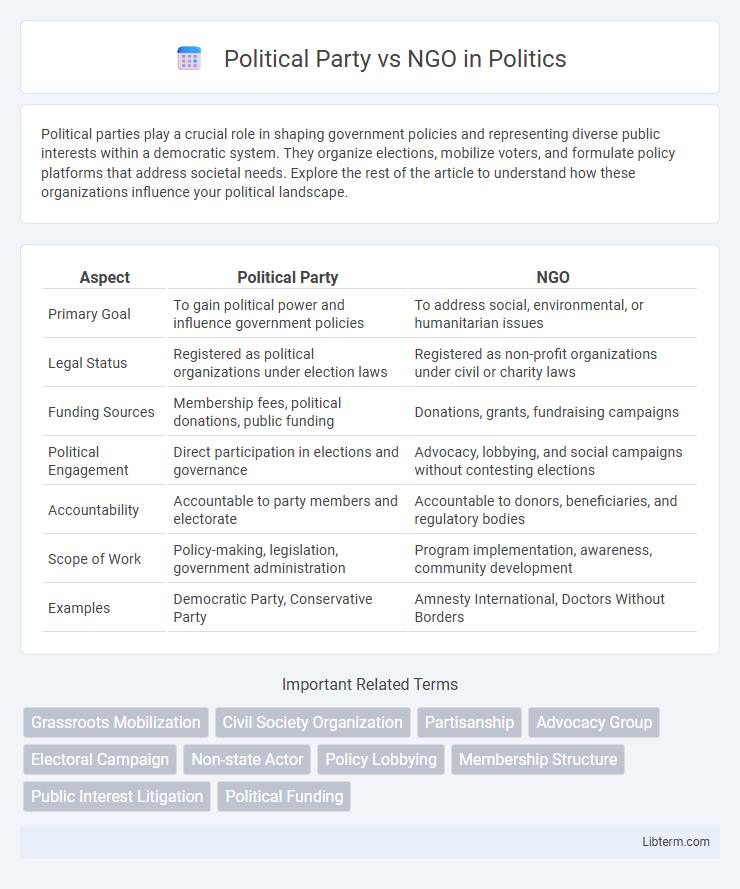Political parties play a crucial role in shaping government policies and representing diverse public interests within a democratic system. They organize elections, mobilize voters, and formulate policy platforms that address societal needs. Explore the rest of the article to understand how these organizations influence your political landscape.
Table of Comparison
| Aspect | Political Party | NGO |
|---|---|---|
| Primary Goal | To gain political power and influence government policies | To address social, environmental, or humanitarian issues |
| Legal Status | Registered as political organizations under election laws | Registered as non-profit organizations under civil or charity laws |
| Funding Sources | Membership fees, political donations, public funding | Donations, grants, fundraising campaigns |
| Political Engagement | Direct participation in elections and governance | Advocacy, lobbying, and social campaigns without contesting elections |
| Accountability | Accountable to party members and electorate | Accountable to donors, beneficiaries, and regulatory bodies |
| Scope of Work | Policy-making, legislation, government administration | Program implementation, awareness, community development |
| Examples | Democratic Party, Conservative Party | Amnesty International, Doctors Without Borders |
Definition of Political Party
A political party is an organized group of individuals who share common political goals and ideologies, aiming to influence government policy and gain power through elections. Unlike NGOs, which focus on social, environmental, or humanitarian issues without seeking political office, political parties directly engage in the political process by nominating candidates for public office. Their primary function is to represent voters in legislative bodies and implement policies aligned with their platform.
Definition of NGO
A Non-Governmental Organization (NGO) is a non-profit, independent entity established to address social, environmental, or humanitarian issues without seeking political power, unlike political parties that aim to influence government policies and gain electoral support. NGOs operate through advocacy, education, and direct service delivery to promote public welfare, often relying on donations, grants, and volunteers. Their legal status and operational frameworks vary globally but consistently emphasize accountability, transparency, and mission-driven objectives.
Core Objectives and Missions
Political parties primarily aim to gain and exercise governmental power by influencing public policy and representing voter interests, focusing on election campaigns and legislative agendas. NGOs (Non-Governmental Organizations) concentrate on advocacy, social services, and humanitarian efforts without seeking political office, aiming to address specific social, environmental, or human rights issues. While political parties operate within political systems to implement policies, NGOs engage in independent activism and programmatic interventions to drive societal change.
Organizational Structure and Leadership
Political parties typically have a hierarchical organizational structure with clearly defined leadership roles such as party leaders, executive committees, and local branches to coordinate policy-making and electoral activities. NGOs often feature a more flexible and decentralized structure, with boards of directors or trustees guiding strategic decisions and operational teams managing specific projects or sectors. Leadership in political parties is usually focused on electoral success and governance influence, whereas NGO leadership emphasizes mission-driven advocacy and program implementation.
Membership and Participation
Political parties require formal membership with specific eligibility criteria and structured participation through voting, campaigning, and holding office. NGOs often allow open or voluntary membership, emphasizing inclusive participation in programs, advocacy, and community activities without strict political alignment. Membership in political parties typically aims at gaining political power, while NGO participation focuses on social impact and civic engagement.
Funding and Resource Mobilization
Political parties primarily secure funding through membership fees, donations from individuals and organizations, and state subsidies, often regulated by electoral laws to ensure transparency. NGOs rely heavily on grants from governments, international organizations, private foundations, and public fundraising campaigns, emphasizing accountability to donors and beneficiaries. Resource mobilization for political parties focuses on election campaigns and party activities, while NGOs channel funds into program implementation, capacity building, and advocacy efforts.
Role in Policy Making
Political parties directly influence policy making by proposing legislation, mobilizing voter support, and holding government positions, which enables them to implement their agendas effectively. NGOs primarily act as policy advocates by conducting research, raising public awareness, and lobbying decision-makers to influence policy formulation indirectly. While political parties have institutional power to enact laws, NGOs play a critical role in shaping policy discourse and ensuring accountability through grassroots involvement and expert analysis.
Influence on Public Opinion
Political parties shape public opinion through election campaigns, policy proposals, and direct engagement with voters, leveraging media and grassroots mobilization to solidify support. NGOs influence public opinion by raising awareness on social issues, advocating for policy changes, and conducting educational programs that mobilize civil society and shape discourse. Both entities utilize strategic communication, but political parties prioritize electoral success while NGOs focus on social impact and advocacy.
Legal Status and Regulation
Political parties operate under specific electoral laws and are registered with governmental election commissions, granting them legal recognition to contest elections and influence public policy. NGOs are registered as non-profit entities under civil or charitable laws, focusing on social, environmental, or humanitarian objectives without direct political contestation. Regulatory frameworks for political parties involve strict compliance with campaign finance, transparency, and reporting rules, whereas NGOs must adhere to donor regulations, tax exemptions, and accountability standards related to their operational scope.
Collaboration and Conflicts
Political parties and NGOs often collaborate on policy advocacy, leveraging NGOs' grassroots networks to influence legislation and public opinion. Conflicts arise due to differing agendas; political parties prioritize electoral success while NGOs focus on social justice and impartiality. This dynamic creates a complex relationship where cooperation hinges on aligning goals despite inherent ideological tensions.
Political Party Infographic

 libterm.com
libterm.com